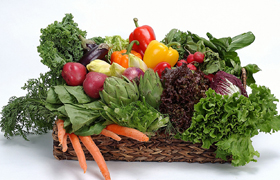Unique online human study researches health benefits of personalised nutrition
Release Date 18 January 2013

The University of Reading is running a UK wide human study, the Food4Me project, to determine if personalised nutrition could lower the number of obesity-related diseases, and is recruiting participants for the study.
Public dietary advice aims to encourage healthy eating, but is the "one-size-fits-all" approach the most effective way of improving the nation's health? Personalised nutrition is based on a person's requirements dependent on their genetic make-up and metabolic characteristics and considers benefits to the individual of certain foods to prevent health conditions such as heart disease, associated with their dietary habits. Recent research has shown that a more personalised approach to public health nutrition may provide greater benefits.
The Food4Me project (www.food4me.org) is funded by the EU and the University of Reading is working with University College Dublin and 10 other partners across the EU.
Studies have shown that people respond differently to various nutrients depending on their genes and metabolic characteristics. For example, omega 3, the healthy fat in oily fish that can help protect against heart disease, is more beneficial to people with a particular genetic make-up.
At the University of Reading, Professor Julie Lovegrove, Deputy Director of the Institute for Cardiovascular and Metabolic Research, and her research team will assess the impact of delivering personalised nutrition to 160 volunteers. Alongside this study, Professor Judi Ellis and Dr Laurie Butler, from the Department of Psychology, will work with consumer groups to gauge public opinion on the idea of designing a diet that is truly individual.
"It's very important that we know how people view personalised nutrition," said Professor Lovegrove. "If you know you are at risk of, for example, cardiovascular disease, will this motivate you to change your diet? Having the ability to design a better diet for someone is one step towards reducing obesity and the diseases that it contributes to. Equally important is understanding what people want and if they think an individual diet is a good idea and would encourage them to change their dietary habits."
How can you help?
Uniquely, the human study is being undertaken online, with the exchange of dietary advice and samples using home kits being carried out remotely. The volunteers will be offered differing levels of advice - tailored to individual physical characteristics and individual genetic make-up, as well as advice with no personalisation. The Reading research team has also assisted in the development of the tools being used to assess the dietary change.
Anyone wishing to take part in the Food4Me study should contact the Food4Me team at the University of Reading (food4me@reading.ac.uk) or...
Find out more and sign up to volunteer on the Food4Me website >>>
Professor Mike Gibney, of the Institute of Food and Health, University College Dublin, who is co-ordinating the four-year project, said: "In employing this holistic approach we hope to draw together cutting-edge research and instigate a significant step forward in the field of personalised nutrition."
Cardiovascular diseases, which include heart attacks, strokes and heart failure, are the cause of approximately 250,000 deaths each year in the UK alone, with similar incidence rates across Europe, and North America, and are becoming an increasing burden in rapidly developing nations with very large populations.